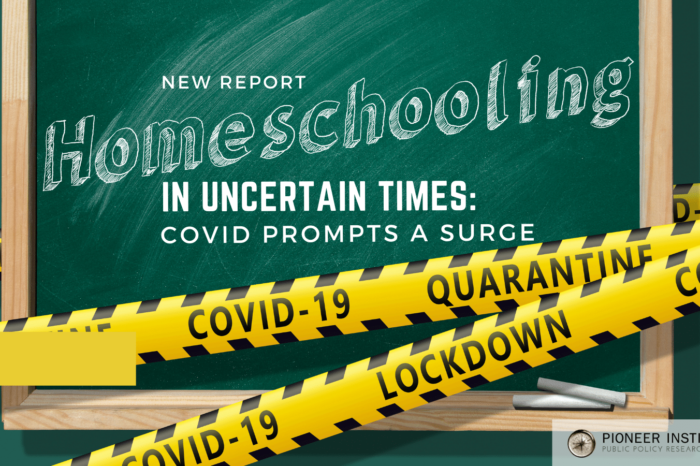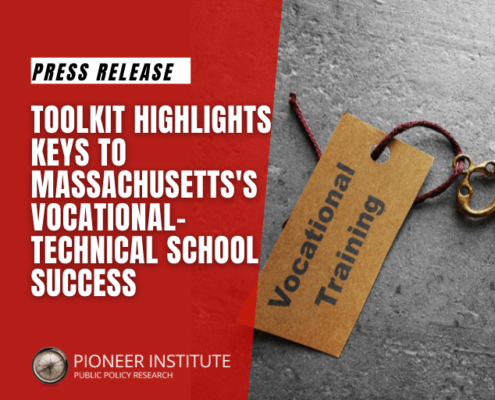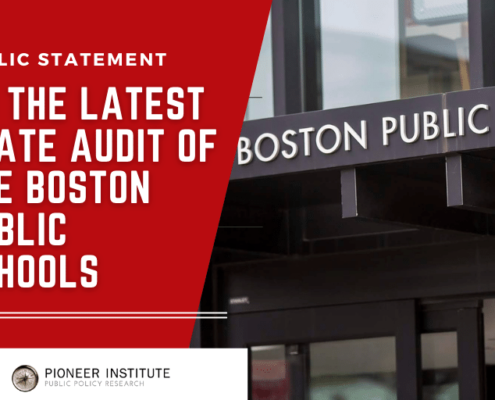Study: After Years of Steady Increases, Homeschooling Enrollment Rose Dramatically During COVID
Policy makers should acknowledge homeschooling as a viable option, offer support to families considering it
BOSTON – After steadily increasing for years, the number of parents choosing to homeschool their children skyrocketed during the pandemic, and policy makers should do more to acknowledge homeschooling as a viable option, according to a new study published by Pioneer Institute.
According to the U.S. Census Bureau, the percentage of households with children being homeschooled has doubled, from 5.4 percent during the 2019-20 school year to 11 percent in 2020-21. Among Black households, it increased nearly five-fold, from 3.3 percent to 16.1 percent in a year.
“You didn’t have to be an expert to see the negative impact remote and hybrid classes had on learning in more traditional schools last year,” said William Heuer, who co-authored Homeschooling in Uncertain Times: COVID Prompts a Surge, with William Donovan. “For a lot of people who had been thinking about homeschooling, the pandemic made it a good time to make the change.”
The sharp drop in just-released MCAS results makes clear the depth of pandemic learning loss.
Some argue that homeschooling enables child abuse and limits exposure to alternative points of view, but at least one study has found that homeschoolers exhibit more political tolerance than their public-school peers.
Homeschooling is legal in every state, but each promulgates its own regulations on the topic. In Massachusetts, the program parents use must be approved in advance by the local school committee or district superintendent.
The authors note that homeschooling saves a significant amount of money. They calculate that if the more than five million students in the U.S. who are homeschooled were to attend public schools, the cost would be about $1 trillion over 13 years of schooling. Heuer and Donovan also calculate that it would require building 4,000 to 10,000 new schools.
“It’s unclear how many families view homeschooling as a temporary solution during the pandemic and how many will continue to do it,” said Jamie Gass, director of education policy at Pioneer Institute. “But after years of steady increases, it is clear that the practice is common enough to be treated as a viable educational choice.”
The authors’ recommendations include state education agencies providing direction and information for those considering homeschooling by putting information about it on their websites with links to statewide homeschooling support groups. They also urge districts to offer parents some “professional development” classes/courses and to allow students to participate in district extra-curricular activities.
The study includes a foreword by Kerry McDonald, a senior education fellow at the Foundation for Economic Education and author of “Unschooled: Raising Curious, Well-Educated Children Outside the Conventional Classroom.”
About the Authors
William Heuer and his wife Loretta homeschooled their two sons from birth through high school. He has been a presenter and panel participant at statewide and national homeschooling conferences and has given numerous media interviews about homeschooling. He is on the Board of Directors of the Massachusetts Home Learning Association (MHLA), the Commonwealth’s oldest statewide homeschooling advocacy organization.
William Donovan is a former staff writer with the Providence Journal in Rhode Island where he wrote about business and government. He has taught business journalism in the graduate programs at Boston University and Northeastern University. He received his undergraduate degree from Boston College and his master’s degree in journalism from American University in Washington, D.C.
About Pioneer
Pioneer’s mission is to develop and communicate dynamic ideas that advance prosperity and a vibrant civic life in Massachusetts and beyond. Pioneer’s vision of success is a state and nation where our people can prosper and our society thrive because we enjoy world-class options in education, healthcare, transportation and economic opportunity, and where our government is limited, accountable and transparent. Pioneer values an America where our citizenry is well-educated and willing to test our beliefs based on facts and the free exchange of ideas, and committed to liberty, personal responsibility, and free enterprise.
Get Updates on Our Education Research
Related Posts:









